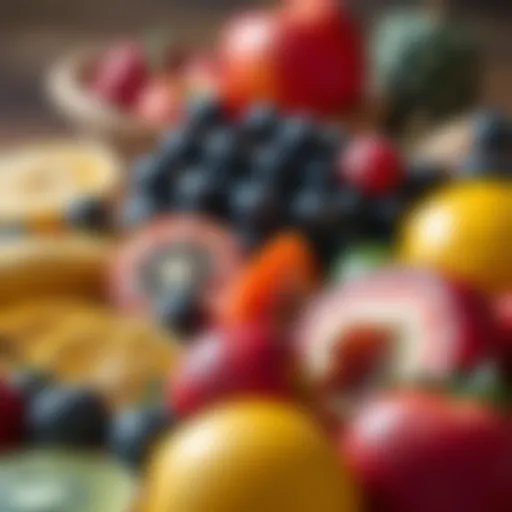Effective Methods for Cleaning Laminate Countertops
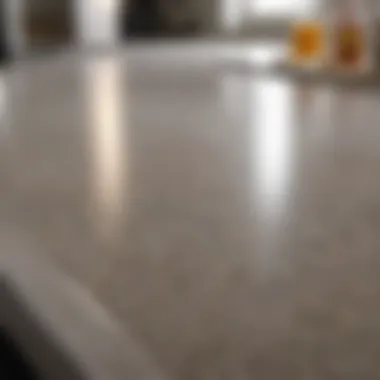

Intro
Maintaining a clean and presentable kitchen is no small feat, especially when it comes to laminate countertops. These surfaces may exhibit a charming finish, but keeping them spick and span can sometimes feel like chasing your tail. The allure of laminate lies in its versatility and affordability, yet many homeowners are unaware of the proper techniques for cleaning and care. Without doubt, knowledge is power—so let’s break it down!
This guide provides practical methods to clean laminate countertops effectively, covering everything from safe cleaning agents to essential tools. Understanding the right ways to maintain these surfaces can prevent wear and tear, extending their lifespan and ensuring your culinary space looks pristine. No one wants to see unsightly stains or scratches on their countertop, right? This is where we come in to help you keep your kitchen elegant and functional.
Ingredients Breakdown
Let’s dive into the essentials for maintaining these surfaces.
Primary Ingredients
When it comes to cleaning laminate countertops, the right ingredients make all the difference. Start with these primary ingredients:
- Dish Soap: A gentle cleanser that easily removes grease and dirt without harsh chemicals.
- Water: Always the basic cleaning agent, essential for dilution and rinsing.
- Vinegar: A natural deodorizer and disinfectant that can cut through grime, although you should use it sparingly since it may dull some finishes.
- Baking Soda: Great for scrubbing tough stains without scratching the surface.
Optional Ingredients
These ingredients might come in handy depending on the mess:
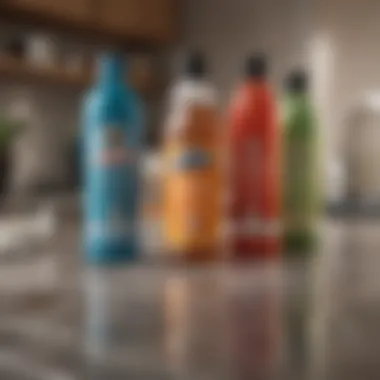

- Isopropyl Alcohol: Effective for disinfecting and removing sticky residues.
- Olive Oil: Can be used sparingly for added shine, but be mindful as it can leave a slippery residue.
Essential Kitchen Tools
Equip yourself with these tools for an efficient cleaning process:
- Soft Cloths or Sponges: Non-abrasive materials that won't damage the laminate surface.
- Spray Bottle: Ideal for mixing your cleaning solutions for easy application.
- A Soft-Bristled Brush: Useful for scrubbing away stubborn stains while avoiding scratches.
- Microfiber Cloths: Perfect for drying and polishing without lint.
Step-by-Step Preparation
Getting ready to clean your countertops isn’t as tricky as it may seem. Here’s how to go about it:
Prepping the Ingredients
- Start by gathering all your cleaning supplies in one spot so you can easily access them.
- If using vinegar or alcohol, mix them with water in a spray bottle at a 1:1 ratio for a safe and effective cleaner.
Cleaning Techniques and Methods
- Wipe Down: Use a soft cloth or sponge dampened with your dish soap solution. Wipe the surface gently, allowing the soap to loosen the grime.
- Scrubbing Stains: For tougher stains, sprinkle baking soda directly on the affected area, and gently scrub with a soft brush.
- Final Rinse: After cleaning, use a cloth soaked in fresh water to rinse down the surface. This step is crucial to remove product residue.
- Drying: Use a microfiber cloth for drying, which will leave your countertop sparkling without streaks.
Assembly and Presentation Tips
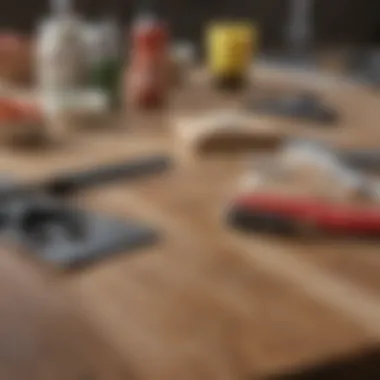

While this may not apply directly to the cleaning process, a tidy countertop sets the stage for your culinary endeavors. Keep appliances to a minimum and arrange utensils neatly to achieve an organized appearance. It's believed that a clean workspace can inspire creativity.
Common Help Sections and Troubleshooting
Frequently Asked Questions
- Can I use bleach on laminate countertops? It’s generally best to avoid bleach as it can damage the surface and lead to discoloration.
- What should I do for a deeper clean? For occasional deep cleans, consider a solution of vinegar, water, and a little dish soap.
Common Mistakes to Avoid
- Using abrasive sponges or steel wool can severely scratch the surface.
- Not rinsing the soap or cleaners off thoroughly can result in a sticky countertop.
Solutions to Potential Problems
If you encounter stubborn stains, a paste made of baking soda and water can work wonders. Apply this mixture, allow it to sit for a bit, and then gently scrub.
In the world of laminate countertop maintenance, diligence and the right approach are key. The more you know, the better you can protect your surfaces, keeping them looking brand new for years to come.
Understanding Laminate Countertops
Laminate countertops have become a staple in kitchens and bathrooms, largely due to their cost-effectiveness and aesthetic versatility. Understanding the nuances of laminate surfaces is crucial for anyone looking to maintain them. The unique characteristics of laminate directly impact cleaning methods, longevity, and overall user satisfaction. Recognizing how these surfaces are constructed, their uses, and advantages as well as disadvantages helps one to make informed choices about maintenance and care.
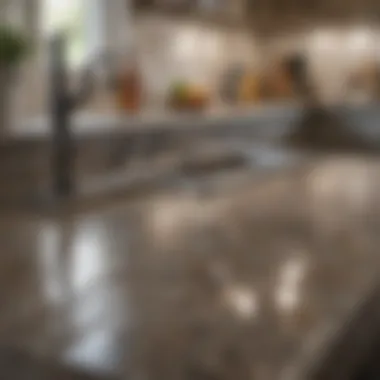

Composition and Structure
Laminate countertops are typically composed of layers of material fused together under high pressure. The base often consists of particleboard or MDF (medium-density fiberboard), which gives the surface its sturdiness. The decorative layer is where you find the colorful patterns and textures that mimic more expensive materials like granite or marble. Finally, a protective overlay of melamine resin guards against scratches and moisture, which is vital in kitchen environments.
Due to this multi-layer composition, laminate surfaces are lightweight yet robust. However, this structure also means they can be easily damaged by excessive heat or sharp objects. Awareness of these characteristics is fundamental in employing the right cleaning techniques to avoid compromising the surface.
Common Uses in Kitchens and Bathrooms
You’ll often spot laminate countertops in various settings, particularly in residential kitchens and bathrooms. Their versatility allows for a wide range of designs and finishes to match any décor style. In kitchens, laminate is favored for its ease of cleaning and resilience against everyday stains from food prep.
In bathrooms, laminate counters provide a low-maintenance option that can handle moisture with relative ease. They are also used in laundry rooms and mudrooms where practical surfaces are needed without breaking the bank. Here, laminate proves adept at standing up to spills, ensuring that spaces remain functional and aesthetically pleasing.
Advantages and Disadvantages
When it comes to laminate, there’s a mix of pros and cons. Here’s a brief look:
Advantages:
- Cost-Effective: Laminate is often more affordable compared to solid surface materials.
- Variety: A myriad of colors and patterns allows for customization in any space.
- Ease of Maintenance: Cleaning laminate is generally straightforward, requiring basic household cleaners and tools.
Disadvantages:
- Durability: While resilient, laminate can be more prone to scratches and burns than other materials like quartz or granite.
- Water Damage: If seams are not properly sealed, moisture can seep in, potentially leading to warping of the underlying structure.
- Not Repairable: Once scratched or damaged, laminate surfaces cannot be easily repaired and may need replacement.
“Understanding both the strengths and limitations of laminate is key to ensuring that it serves your culinary space well over time.”
Ultimately, honing your knowledge about laminate countertops lays the foundation for effective cleaning and sustainable maintenance practices.

